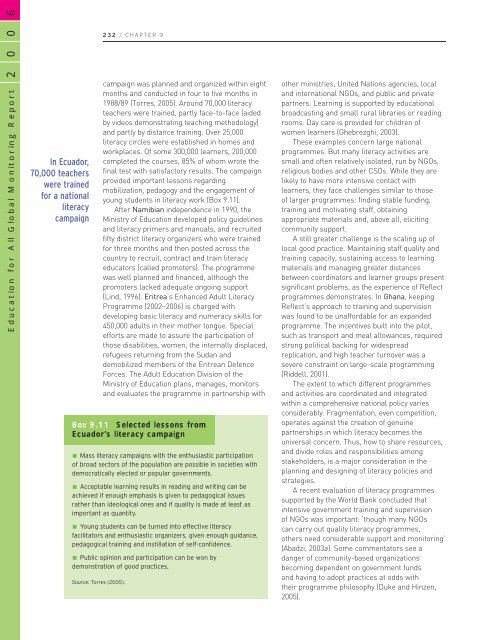literacy for life; EFA global monitoring report, 2006 - Institut de ...
literacy for life; EFA global monitoring report, 2006 - Institut de ...
literacy for life; EFA global monitoring report, 2006 - Institut de ...
Create successful ePaper yourself
Turn your PDF publications into a flip-book with our unique Google optimized e-Paper software.
0<br />
0<br />
6<br />
232 / CHAPTER 9<br />
2<br />
Education <strong>for</strong> All Global Monitoring Report<br />
In Ecuador,<br />
70,000 teachers<br />
were trained<br />
<strong>for</strong> a national<br />
<strong>literacy</strong><br />
campaign<br />
campaign was planned and organized within eight<br />
months and conducted in four to five months in<br />
1988/89 (Torres, 2005). Around 70,000 <strong>literacy</strong><br />
teachers were trained, partly face-to-face (ai<strong>de</strong>d<br />
by vi<strong>de</strong>os <strong>de</strong>monstrating teaching methodology)<br />
and partly by distance training. Over 25,000<br />
<strong>literacy</strong> circles were established in homes and<br />
workplaces. Of some 300,000 learners, 200,000<br />
completed the courses, 85% of whom wrote the<br />
final test with satisfactory results. The campaign<br />
provi<strong>de</strong>d important lessons regarding<br />
mobilization, pedagogy and the engagement of<br />
young stu<strong>de</strong>nts in <strong>literacy</strong> work (Box 9.11).<br />
After Namibian in<strong>de</strong>pen<strong>de</strong>nce in 1990, the<br />
Ministry of Education <strong>de</strong>veloped policy gui<strong>de</strong>lines<br />
and <strong>literacy</strong> primers and manuals, and recruited<br />
fifty district <strong>literacy</strong> organizers who were trained<br />
<strong>for</strong> three months and then posted across the<br />
country to recruit, contract and train <strong>literacy</strong><br />
educators (called promoters). The programme<br />
was well planned and financed, although the<br />
promoters lacked a<strong>de</strong>quate ongoing support<br />
(Lind, 1996). Eritrea’s Enhanced Adult Literacy<br />
Programme (2002–<strong>2006</strong>) is charged with<br />
<strong>de</strong>veloping basic <strong>literacy</strong> and numeracy skills <strong>for</strong><br />
450,000 adults in their mother tongue. Special<br />
ef<strong>for</strong>ts are ma<strong>de</strong> to assure the participation of<br />
those disabilities, women, the internally displaced,<br />
refugees returning from the Sudan and<br />
<strong>de</strong>mobilized members of the Eritrean Defence<br />
Forces. The Adult Education Division of the<br />
Ministry of Education plans, manages, monitors<br />
and evaluates the programme in partnership with<br />
Box 9.11 Selected lessons from<br />
Ecuador’s <strong>literacy</strong> campaign<br />
Mass <strong>literacy</strong> campaigns with the enthusiastic participation<br />
of broad sectors of the population are possible in societies with<br />
<strong>de</strong>mocratically elected or popular governments.<br />
Acceptable learning results in reading and writing can be<br />
achieved if enough emphasis is given to pedagogical issues<br />
rather than i<strong>de</strong>ological ones and if quality is ma<strong>de</strong> at least as<br />
important as quantity.<br />
Young stu<strong>de</strong>nts can be turned into effective <strong>literacy</strong><br />
facilitators and enthusiastic organizers, given enough guidance,<br />
pedagogical training and instillation of self-confi<strong>de</strong>nce.<br />
Public opinion and participation can be won by<br />
<strong>de</strong>monstration of good practices.<br />
Source: Torres (2005).<br />
other ministries, United Nations agencies, local<br />
and international NGOs, and public and private<br />
partners. Learning is supported by educational<br />
broadcasting and small rural libraries or reading<br />
rooms. Day care is provi<strong>de</strong>d <strong>for</strong> children of<br />
women learners (Ghebrezghi, 2003).<br />
These examples concern large national<br />
programmes. But many <strong>literacy</strong> activities are<br />
small and often relatively isolated, run by NGOs,<br />
religious bodies and other CSOs. While they are<br />
likely to have more intensive contact with<br />
learners, they face challenges similar to those<br />
of larger programmes: finding stable funding,<br />
training and motivating staff, obtaining<br />
appropriate materials and, above all, eliciting<br />
community support.<br />
A still greater challenge is the scaling up of<br />
local good practice. Maintaining staff quality and<br />
training capacity, sustaining access to learning<br />
materials and managing greater distances<br />
between coordinators and learner groups present<br />
significant problems, as the experience of Reflect<br />
programmes <strong>de</strong>monstrates. In Ghana, keeping<br />
Reflect’s approach to training and supervision<br />
was found to be unaf<strong>for</strong>dable <strong>for</strong> an expan<strong>de</strong>d<br />
programme. The incentives built into the pilot,<br />
such as transport and meal allowances, required<br />
strong political backing <strong>for</strong> wi<strong>de</strong>spread<br />
replication, and high teacher turnover was a<br />
severe constraint on large-scale programming<br />
(Rid<strong>de</strong>ll, 2001).<br />
The extent to which different programmes<br />
and activities are coordinated and integrated<br />
within a comprehensive national policy varies<br />
consi<strong>de</strong>rably. Fragmentation, even competition,<br />
operates against the creation of genuine<br />
partnerships in which <strong>literacy</strong> becomes the<br />
universal concern. Thus, how to share resources,<br />
and divi<strong>de</strong> roles and responsibilities among<br />
stakehol<strong>de</strong>rs, is a major consi<strong>de</strong>ration in the<br />
planning and <strong>de</strong>signing of <strong>literacy</strong> policies and<br />
strategies.<br />
A recent evaluation of <strong>literacy</strong> programmes<br />
supported by the World Bank conclu<strong>de</strong>d that<br />
intensive government training and supervision<br />
of NGOs was important: ‘though many NGOs<br />
can carry out quality <strong>literacy</strong> programmes,<br />
others need consi<strong>de</strong>rable support and <strong>monitoring</strong>’<br />
(Abadzi, 2003a). Some commentators see a<br />
danger of community-based organizations<br />
becoming <strong>de</strong>pen<strong>de</strong>nt on government funds<br />
and having to adopt practices at odds with<br />
their programme philosophy (Duke and Hinzen,<br />
2005).

















